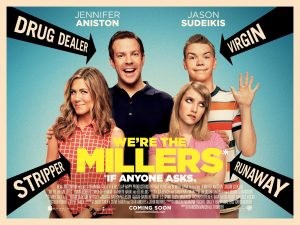Perhaps one of the best, most popular comedies of 2013, We’re the Millers stars, most namely, Jason Sudeikis and Jennifer Aniston as they serve as parents in a thrown together ‘family’ that travels across the US-Mexico border to retrieve what is originally referred to in the film as “a smidge of weed”, but later turns out to be of a greater capacity. The film progresses further even, as this dysfunctional, diverse ‘family’ later discovers that they were in fact stealing this weed from a Mexican drug lord, who will be mentioned a bit later. Now I don’t know much about the director of the film, let alone his name off the top of my head. All that I remember is that he is male, in fact, but any significant details past that are merely an internet search away. The details don’t seem to matter for the sake of this essay, however, and that lone detail that I can recall (of the director being male), I have come to think, seems to be enough at this point.
Getting back to the film, the different pieces of the family, I think, are worth briefly touching upon, just to get a sense of their dynamic and our perspective on them as viewers. David, played by Jason Sudeikis, is a single-man, yet more importantly, a local drug dealer in Denver. That seems to be his main source of income, until all of his money and weed is stolen by thugs. In contrast, Rose, or who later comes to be known as Sarah, played by Jennifer Aniston, is a stripper in the Denver area in much need of cash and housing, due to the actions of her ex-boyfriend. Kenny, an uptight, nerdy teenager who lives in the same building as David and Sarah, frankly just seems to be a kid who is in seek of company, as his mother hasn’t returned to the apartment in days, even weeks. And lastly is Casey, a runaway kid, who is portrayed as living on the streets and in desperate need of money. These four join together and become the Millers, all just so David can receive a major payday from a much larger, wealthier drug lord in the area.
The humor and personalities that each and every individual brings to this film varies between them, and ultimately, helps structure the obscure dynamic that the Millers create. There’s a little more to this film, however, that is, hidden through this humor and the distraction that each and every individual in the film proposes, a strict and imposing male lens and mindset behind the camera and in the production and editing throughout the entirety of the film.
Right from the beginning we are led to see Rose as a stripper, that is part of our first impression of her. Yes, we do see her expression of her own disappointment in her occupation, yet she still continues to use her body, for male pleasure, in order to receive some degree of income; in fact, it isn’t until she is asked to have sex with the clients that she actually gives up the job. And that’s just the beginning. David, well aware of Rose and her occupation, goes to the strip club in seek of bringing Rose with him, and the others, to make this trip down to Mexico, a trip that she originally denies, until she recognizes her desperate need for finances. Suiting to the male eye, while receiving a lap dance, as if Rose is not being objectified enough, David literally says that he is asking to “rent” her for this trip, as if there is no problem with that, that it is perfectly acceptable, especially using the terminology in which he chooses. David takes her occupation as a stripper and shoves its reputation back into her face, merely acting as if it defines her own self-worth, while further reinforcing a scene that accepts male dominance and female subjugation.
Switching gears, Kenny provides us a bit of a different personality and different viewpoint than that of Rose. Kenny meets a girl on their return trip home, Melissa, whom he’s interested in; but he’s initially inhibited by his lack of experience kissing women. However, the ‘family’ helps resolve that lack of experience. The scene eventually arrives at Kenny trading off makeouts with Casey and Rose, practicing; all the while David is looking on while eating a bag of chips, as if an innocent bystander looking in on the spectacle and taking in its full effects. I mean, he even takes a picture of Kenny and Casey kissing. Aside from the fact that these two women are kissing Kenny back and forth, the fact that David looks onto the scene in the interested and encouraged way that he does makes it almost seem pornographic in a sense, as if he’s looking in on some kind of incestuous sexual scene in a voyeuristic fashion, just as Melissa sees it (not voyeuristically, of course, but rather disturbing) as she enters through the door of the RV. To make matters even more obscure, as Melissa runs out the door, David slams his chip bag down on the counter and says a frustrated “fuck”, almost as if he’s irritated by her disruption of the scene, rather than his concern for Kenny. But, we don’t initially come to see the scene (in its entirety) as improper or frankly even that crude, we just take it as justified for the improvement and betterment of a man, so that he can further intrigue another woman, which nearly serves as a reinforcement for male influence, and further normalizes a male perspective in the film.
Coming back to Rose, the pinnacle of the male lens is displayed in times of desperate measure for the Millers. Trapped by Pablo Chacon, the drug lord whom they stole the weed from, Rose offers to “show her worth” by captivating him, by stripping. Yes, she makes one final return to her prior occupation, exposing her body to the pleasure of male eyes. The scene itself, at times, attempts to even make it seem glamorous, with assistance of the sunlight, a shower, and sparks. You can nearly sense the intention of a male gaze as David looks directly into the camera and shrugs, raising his eyebrows, almost as if the mere exposure of Rose is not only invaluable to him, but acceptable as long as they are safe, not to mention the fact that it may be visually pleasurable to him, as well as Kenny, as he adjusts his pants in what looks to be a nearly unbreakable captivation. All this is displayed in the scene as if it is simply not enough that Rose is showing that she’s valuable by the use and spectacle of body. Does the film do anything to show this to us as viewers, to show that Rose is more than a stripping teaseful distraction in order for everyone to be safe, to escape? Not really. The assistance of the music, editing, and lighting further draw the viewer in to the movements and body of Rose, as the cuts and focus of the camera shift between the spectators (watching intently) and Rose’s body (in some cases, in close-up fashion).
One scholar argues that “It’s when filmmakers run out of or run from creativity that they retreat to the economic safe haven of sex, violence, car crashes, and jiggling bodies” and that is the exact case in this film. The action and sexual displays appeal to the male eye, and they don’t seem inappropriate, or even unnecessary, in the film, but pivotal to us in maintaining that gaze and level of captivation in what we are seeing (just like the men in the film during Rose’s strip scene).
Aside from these moments that either objectify women or reinforce male dominance and influence, David tends to make comments that either result in women being furtherly objectified or that would be seen as disrespectful towards women in any usual circumstance throughout the entirety of the film. But the film creates something different for us. The movie normalizes these jokes and it allows and guides us to accept them through our laughter, no matter how wrong, crooked, and disrespectful that they may be. Due to that normalization, a male perspective is built up further, as males are practically given a more dominant role, due to the subjugation of women. Also, another scholar argues that “film has become a mirror of society’s view of the female body”, but rather, that view may be inflicted upon us as individuals, just as it is inflicted upon the viewers of this film. It is not necessarily generated through the viewer, but rather through the way the viewer is led to see and interpret the film. We come to recognize the strip teases and near nudity as almost acceptable and necessary, nearly against our own will; it’s practically imposed through the lens of the camera and editing of the scenes in which we see close-ups of the female body.
In the end, David does, in fact, grow to care and respect these people, but that may be laid out to us to keep viewers on his side, to let him off and reside with him, as we begin to realize his selfishness. We easily forgive him. The somewhat crooked way of seeing the ending of this film, as the four of them move into a home together, under a witness protection program, is that David ends up actually changing the lives of those who came with him (maybe even for the better). David, the, at one time, self-concerned, money-seeking individual, comes to change the lives of Sarah (now ‘stripped’ of the name Rose), Casey, and Kenny. He gives them a home, whether it’s in the most literal sense, for Sarah, the most figurative sense, for Kenny, or in both, for Casey.
All the visual matters and jokes that support male empowerment and female objectification, are really somewhat trivial, they only support the true major source that is the problem with the whole male lens in its own right. The biggest problem is that the male lens of these films makes the objectification and subjugation of these women appear normal, it makes it appear okay and acceptable. The views of women exposing themselves normalizes that scene to us as the viewers, we come to see it, maybe even expect it. The film provides us that belief, we don’t have to work to find it, or, for that matter, feel too guilty for seeing it. The true danger is when these false beliefs can carry over into the real world, when people accidentally, or subconsciously, forget that some of these things are unacceptable, that women shouldn’t, in fact, be objectified; and that has become a problem in Hollywood today, not only in films, but in the actual tangible world.
An earlier draft of this essay was read by Cory Lund.
I have written this essay in the style of Chuck Klosterman.
Main proposition influenced by Laura Mulvey’s “Visual Pleasure and Narrative Cinema”
Works Cited
Durham, Meenakshi Gigi, and Douglas M Kellner (ed.). Media and Cultural Studies: Keyworks. Oxford: Blackwell, 2001.
Thurber, Rawson Marshall, director. We’re the Millers. Warner Bros, 2013.








